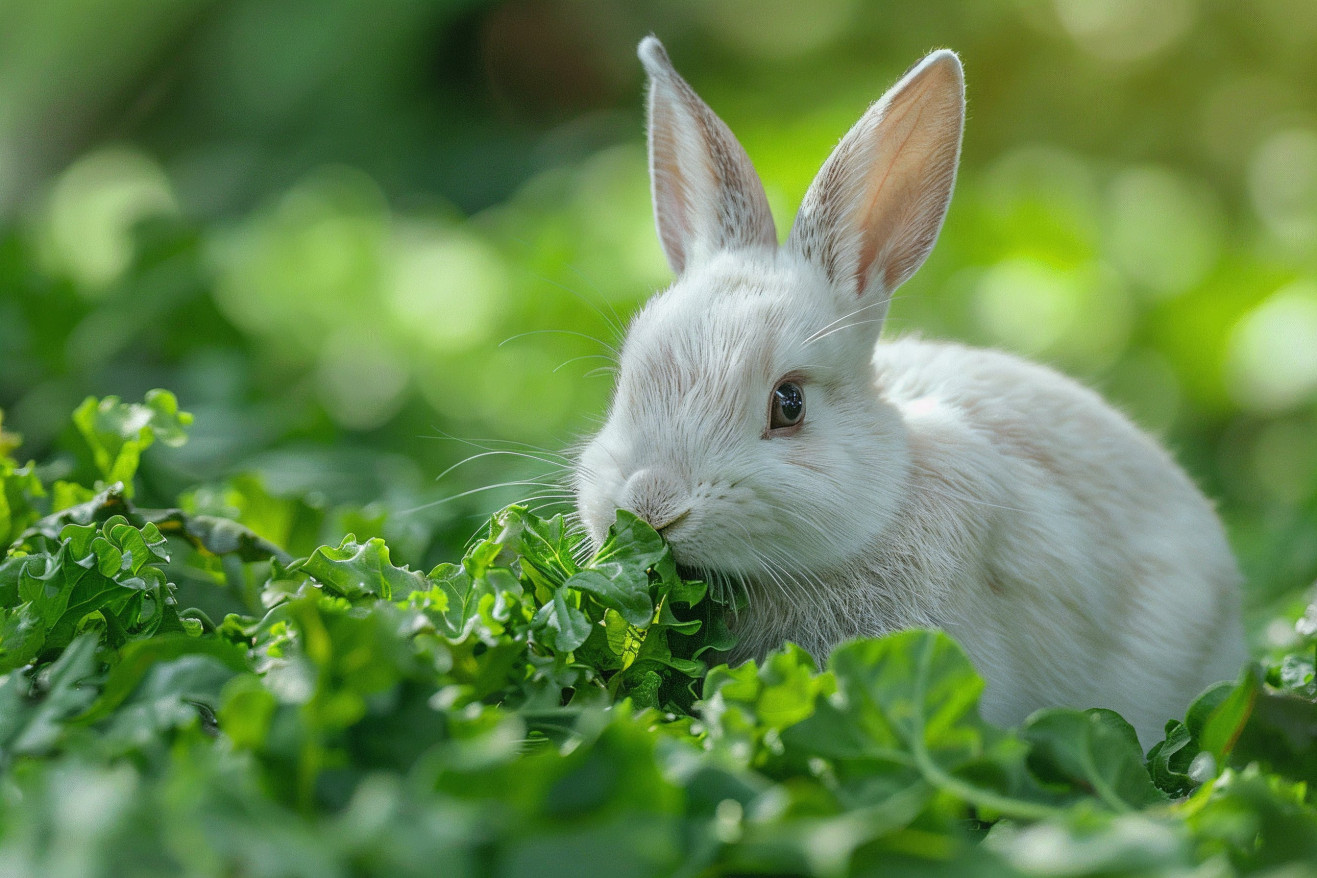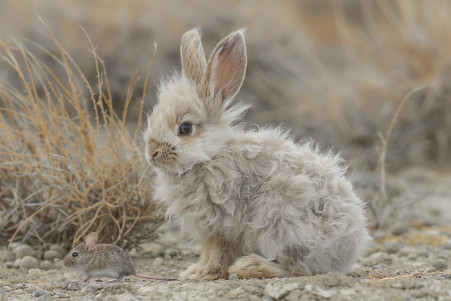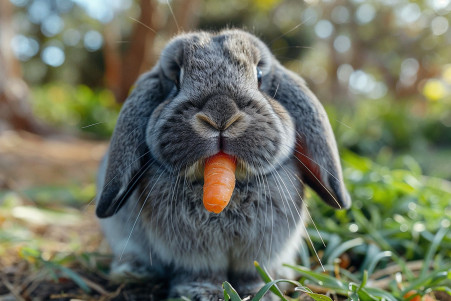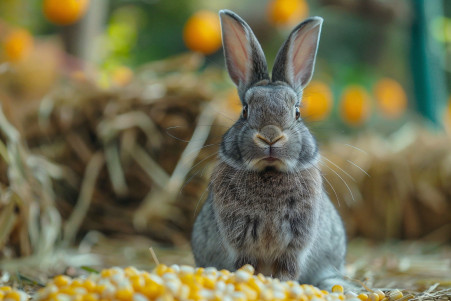Do Rabbits Eat Meat? Understanding Their Herbivorous Diet
8 March 2024 • Updated 7 March 2024

Rabbits are often recognized for their cute behaviors, but have you ever thought about their highly specific diet? It’s true, rabbits are herbivores, which means they eat a diet that is exclusively made up of plants.
Their diet consists of a combination of hay, leafy greens, and a small amount of pellets. While high-fiber foods like hay are important for their digestion and dental health, fruits and root vegetables should only be eaten on occasion.
In this article, we will look at the interesting biology and ecology of rabbits to explain why they are herbivores. We will look at nutritional research, veterinary research, and ecological research to explain why these cute animals have stuck to a plant-based diet. By taking a multidisciplinary approach, you will not only learn what rabbits eat, but why their diet is important for their health and the health of the places they live.
Do rabbits eat meat?
The Herbivorous Blueprint: How a Rabbit’s Digestive System Works
The rabbit’s digestive system is a prime example of the unique adaptations that have evolved to support a herbivorous lifestyle. According to Veterinary Clinics: Exotic Animal Practice, rabbits are considered folivores, a type of specialized herbivore that primarily eats leaves and other plant matter.
However, rabbits have a different digestive system than other herbivores, with a high-capacity digestive tract that enables them to separate out the digestible parts of their food from the fibrous parts that can’t be digested. This allows them to excrete the indigestible fiber quickly while still absorbing the nutrients they need.
This system is based on hindgut fermentation, which occurs in the cecum. The cecum is the largest in relation to body size of any mammal. Inside the cecum, microorganisms ferment complex carbohydrates to produce volatile fatty acids, which are the main source of energy for the rabbit.
This essentially turns the cecum into a fermentation chamber. However, this process only works if the rabbit is eating a high-fiber diet, which is needed to keep the cecum moving and the nutrients being absorbed.
In addition to hindgut fermentation, rabbits also practice cecotrophy, which is the consumption of cecotrophs, or soft pellets that are produced as a result of cecal fermentation. According to Veterinary Clinics, this enables rabbits to absorb nutrients that weren’t absorbed during the first pass through the digestive system, which shows how important these adaptations are to the rabbit’s survival.
Rabbits eat the cecotrophs directly from the rectum, which means they don’t have to be broken down again, and is another example of how the rabbit’s digestive system is designed to be self-sustaining.
Knowing how the rabbit’s digestive system works and the role fiber plays in it makes it clear how important it is to make sure a rabbit’s diet is well-balanced. This also provides a foundation for understanding the specific nutritional needs and dietary makeup that will help ensure these herbivores stay healthy and thrive.
Building a Healthy Diet for Herbivorous Rabbits
The perfect rabbit diet is a complex combination of nutrients, most of which come from plants. ScienceDirect explains that protein is important, and grass is a good source of the protein and amino acids that rabbits need to grow and produce wool.
However, the rabbit’s age and the maturity of the grass can impact the digestibility of the protein. It is recommended that the protein content of the diet for domestic rabbits be between 12–16% to avoid upsetting the balance of their sensitive gut microbiome.
Fiber is the most important part of a rabbit’s diet, and it’s important for both their dental and digestive health. Protexin Vet explains that hay should make up approximately 85% of a rabbit’s diet because the high-fiber content helps to keep the gut moving and reduce dental problems. Wild rabbits eat a diet that’s high in grass and wild plants, which is ideal for their digestive system.
On the other hand, UK Pet Food warns against feeding rabbits high-starch, high-sugar diets that can lead to obesity and digestive issues. To avoid selective feeding and make sure rabbits get all the nutrients they need, pet owners should limit pellets to 5% of a domestic rabbit’s diet. Knowing these nutritional details can help you keep rabbits healthy and appreciate their place in the environment.
The Ecological Role of the Herbivorous Rabbit
As herbivores, rabbits have an important ecological impact. Their feeding behavior influences the vegetation structure of their environment and the dynamics of ecosystems.
According to the Global Soil Biodiversity Initiative, the presence of herbivores like rabbits leads to different responses in soil communities, and these responses are influenced by a variety of factors including climate and the soil’s food web. In temperate ecosystems, for example, rabbits have been shown to increase soil respiration, an important biological process.
Rabbits also have an ecological impact through their role as prey. As primary consumers, rabbits are an important part of the food web, providing food for many different predators. This has been observed both in the rabbits’ native habitats in the Iberian Peninsula and in places like Australia, where the rabbits have had a major ecological impact.
The impact of domestication on the rabbit diet is clear. While domestic rabbits still engage in natural behaviors like burrowing and foraging, the food they eat, which is often provided by humans, is much less varied than the wild plants they would eat in the wild.
This can have an impact on their behavior, health, and welfare. This complex relationship highlights the importance of diet for the welfare of individual rabbits and the health of the environment.
How Diet Affects Behavior and Health in Rabbits
The impact of a rabbit’s diet goes far beyond what it does to keep them alive; it also affects their behavior and overall well-being. A study by Thompson et al. published in ResearchGate in 2023 showed that rabbits with ad libitum access to hay were able to display more natural foraging behaviors and maintain higher activity levels than rabbits that were fed a restricted diet.
This demonstrates that a balanced herbivorous diet is important not only for a rabbit’s physical health but also for their mental health, as it allows them to engage in natural behaviors like foraging.
The diet of rabbits has also been influenced by their domestication, as explained in the Journal of Small Animal Practice’s review of rabbit diets. While wild rabbits eat a wide variety of grasses and other plants, domestic rabbits are often exposed to a more limited selection, which can impact their natural behaviors and potentially their health.
Proper diet is also important in helping rabbits avoid common health problems. A study published on PubMed showed that muesli-based diets can lead to selective feeding in rabbits, which can result in imbalanced nutrition and decreased water intake, both of which can lead to health issues.
However, making sure that rabbits have access to good-quality hay and a variety of leafy greens can help prevent these problems and set rabbits up for good health and natural behaviors that are similar to those of their wild counterparts.
How to Feed Your Rabbit a Healthy Diet
It’s important to make sure that your rabbit’s diet is as close to their natural herbivorous diet as possible.
The RSPCA explains that good-quality hay or grass should make up the majority of a rabbit’s diet, and it helps with digestion and dental care.
Make sure to choose fresh, long-strand hay because it has the right amount of fiber and it encourages the grinding motion that rabbits use to keep their teeth healthy. Rabbits should also be fed a selection of leafy greens every day, like kale, broccoli, and parsley, but make sure to wash them thoroughly and remove any pesticides.
In addition, rabbits need to make sure that they’re drinking enough water. According to nidirect, rabbits should have access to fresh, clean water at all times to avoid dehydration. It’s best to use a water bowl because rabbits tend to drink more water from a bowl than a sipper bottle, according to the Merck Veterinary Manual.
There are a few things to avoid when feeding your rabbit, including feeding them too many pellets (which should only be a small part of their diet in addition to hay and greens) and feeding them too many high-carb or high-sugar treats.
Make sure to monitor their eating habits because any sudden changes could be a sign of a problem. By being mindful of what your rabbit eats, you can help them stay healthy and improve their quality of life.
The Importance of a Rabbit’s Herbivorous Diet
In delving into the rabbit’s herbivorous nature, we have discovered the complex biological and ecological web that makes up their diet. From the rabbit’s unique cecum and need for fibrous food in their specialized digestive system to their role as prey, the rabbit’s diet is not just a preference but a biological necessity that is essential to their digestive and dental health.
We have also learned how the rabbit’s diet impacts their ecological niche, from their effect on vegetation to their impact on the health of ecosystems. Their role as prey and their impact on soil and plant life show that the importance of the rabbit’s diet goes beyond their individual health.
Most importantly, we have shown how the rabbit’s diet is central to their well-being, impacting everything from their behavior to their physical health. This means that it is essential for responsible rabbit owners to have a complete understanding of their dietary needs.
As the guardians of their health, it is our responsibility to provide a diet that meets their needs while respecting their herbivorous nature, ensuring that they are healthy and happy throughout their lives.


